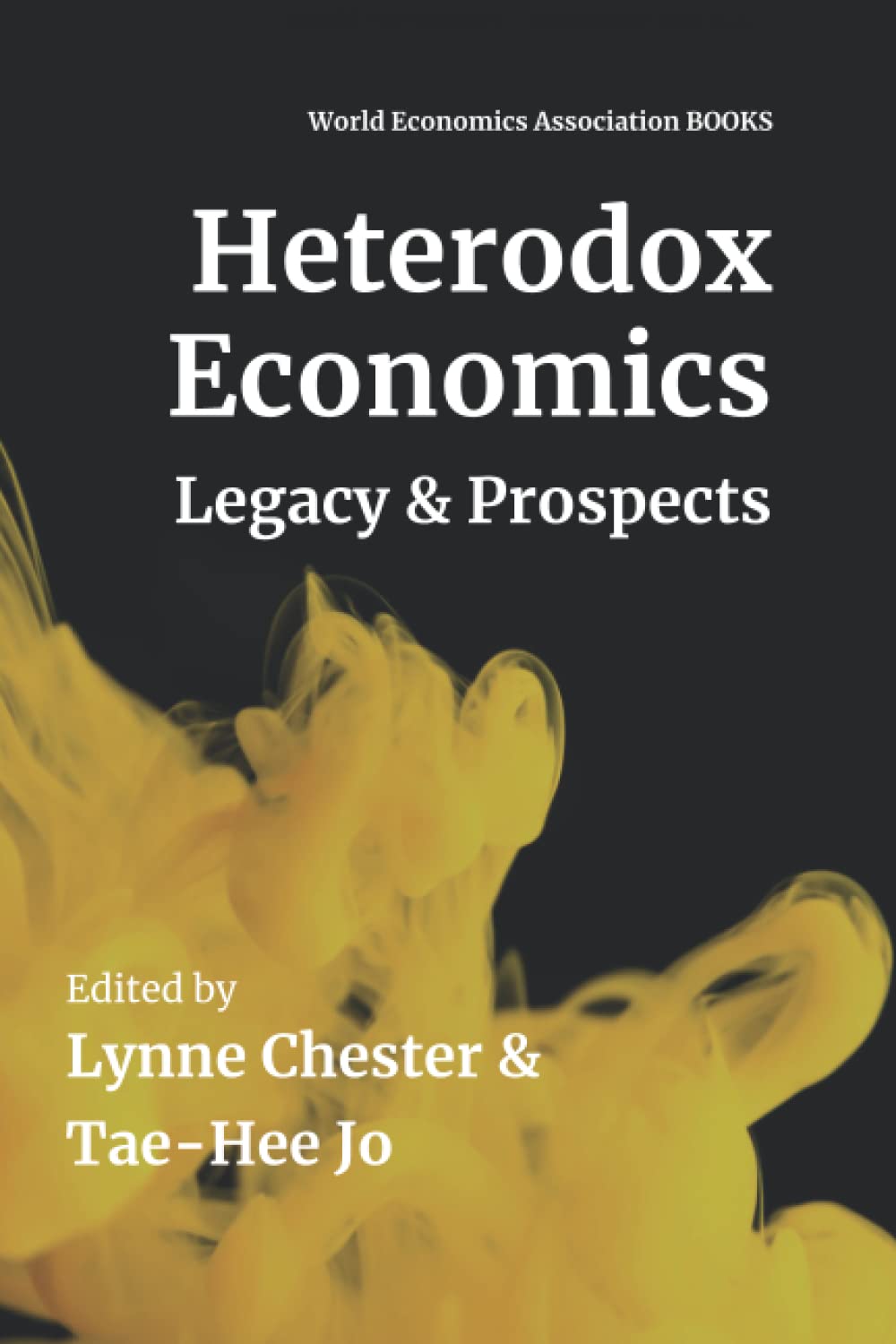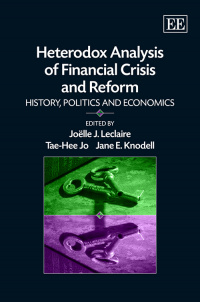Heterodox Economics: Legacy and Prospects (2022), edited by Lynne Chester and Tae-Hee Jo. World Economics Association Books. ISBN-13: 978-1911156611 (paperback, US$14.99), 978-1-911156-62-8 (eBook, Kindle, US$5.99), 393 pages. This book is now available on Amazon.

Table of Contents
Foreword by CRISTINA MARCUZZO
Preface
Prologue: Heterodox economics: a future on what terms? / JAMIE MORGAN
- Introduction: A new era of galvanization and energization for heterodox economics / LYNNE CHESTER AND TAE-HEE JO
- Critics, outsiders, or simply economists? Revisiting the history of heterodox economics / DANIELLE GUIZZO
- Cambridge social ontology and the reconstruction of economic theory / NUNO ORNELAS MARTINS
- Heterodox economics and ideology / TAE-HEE JO
- On some limits to pluralism / CARLO D’IPPOLITI
- Towards interdisciplinarity as instinctive / BEN FINE
- Taking the institutions and communities of heterodox economics forward / JAMIE MORGAN
Epilogue
Endorsements
A critical and surprisingly novel collection, by an outstanding group of contributors, that explores the nature of, and prospects for, heterodoxy from numerous angles. It is not always the case that an edited collection yields a set of contributions that cohere around the intended theme. This one does. – Tony Lawson, Emeritus Professor of Economics and Philosophy, Faculty of Economics, University of Cambridge (UK)
The unravelling of the predominant neoliberal model provides a timely opportunity to freshly examine the current state of heterodox economic alternatives. With original and sagely crafted papers, this new edited volume of scholarship from senior and junior scholars covers economic history, theory, ideology, methodology, interdisciplinarity, and relevance of and limits to pluralism, and will assuredly energize heterodox economist practitioners, as intended. – Deborah M. Figart, Distinguished Professor Emerita of Economics, Stockton University (USA)
This book, co-edited by Chester and Jo, is extraordinarily necessary and welcome. The set of authors and perspectives that they have managed to bring together showcases the intellectual soundness of contemporary heterodox economics, and contributes, along with other recent titles, to ‘change the conversation’ and question the power structures that sustain mainstream academic economics that is simultaneously cause and consequence of the exhausted hegemonic model of contemporary capitalism (neoliberal, financialised, colonial, patriarchal and ecologically predatory), which must be overcome. – Professor Jorge Garcia-Arias, University of León (Spain), and SOAS, University of London (UK)
This timely volume adds to the rich debate and thinking about the role and future of heterodox economics. The contributors explore these issues in new ways that will invigorate our understanding of the potential for heterodox perspectives to make a difference. – Stephanie Seguino, Professor of Economics, University of Vermont (USA)
This timely and topical compilation is not just another volume that reflects the state, issues, and perspectives of heterodoxy’s community (and its relation with the mainstream). It is also a unique balance sheet of the relevant developments of the last decade, discussing diversity and convergence among heterodoxies and their weaknesses and strengths, and it does so not only in theory and policy but particularly within AND outside academia. – Wolfram Elsner, Professor of Economics (retired), University of Bremen (Germany) and Editor-in-Chief, Review of Evolutionary Political Economy
The essays gathered here by Chester and Jo’s promise to be impactful on our understanding of the past and present of heterodox economics. More importantly, by focusing on questions of ideology, pluralism and interdisciplinarity, they crystalise its future. – Andrew Mearman, Associate Professor of Economics, University of Leeds (UK)
A thought-provoking and defiant exposition of the continuing relevance of heterodox economics. – Andrew Trigg, Professor of Economics, The Open University (UK)
One may wonder why we need another book on heterodox economics. The answer is quite simple: heterodoxy has yet to enjoy any significant successes in replacing economic orthodoxy as the dominant source of policy. As a consequence, we continue to witness widespread inequality, poverty, and injustice, not to mention a planet on fire, as the direct result of the recommendations of our mainstream colleagues. This new work not only critiques and draws lessons from the earlier volumes, but it lays out a fresh perspective regarding how we can most effectively leverage our strengths into a movement that can finally put real-world, civilized economics at the forefront of our discipline. – John T. Harvey, Professor of Economics, Texas Christian University (USA)
This ambitious collection of essays provides the most critical engagement with heterodox economics purposes, strengths, and challenges of our time. Our generation faces a dramatic intrication of multiple crises fuelled by capitalist competition and systemic drive to accumulation, which is also a failure of economic thinking. Contra adverse institutional headwinds, the book lays a firm epistemological ground for heterodox economists, putting them in position to provide social actors the crucial concepts and economic understandings required to confront contemporary hardships and find a collectively desirable way forward. – Cédric Durand, Professeur Associé d’Économie Politique, Université de Genève (Switzerland)
This very impressive collection of papers by authorities in the field of heterodox economics deals with some major issues, including diversity and the limits to pluralism, multidisciplinarity and the links to other social sciences, and the role of political ideology. It will be essential reading for all those who are critical of mainstream economic theory. – John King, Emeritus Professor, La Trobe University (Australia)
Heterodox economics in its many forms is the result of ongoing contestation of mainstream economic theories, policies, and practices, as well as original theoretical developments and efforts to address social injustices and complex realities across regions. Always challenging and challenged, contemporary heterodox economists are energized by urgency, difficulties, and possibilities for collaboration. What is the result from now long ongoing efforts of building bridges, opening inquiries across approaches, disciplines, and regions, and connecting to practices and interventions outside of academia? This collection addresses ongoing questions about scope, strategies, production of knowledge, and futures of heterodox economics by referring critically to prominent interventions and by offering original viewpoints. The essays inspire a positive attitude about the future for heterodox economics. – Zdravka Todorova, Professor of Economics, Wright State University (USA)
There has always been more than one perspective on the best way to organise our economic system, but the institutional and political setting of the discipline of economics makes sure only one way gets a voice. It’s their defining assumptions or you’re out. The collective heterodox economics recognises this imbalance and is fighting against it. It is an eclectic community who wishes to push the self-defined boundaries of the orthodoxy, who is creating a setting where generations of young heterodox economists can get hired. Doing so is the only way of achieving any advancement fit to address real-world issues and the role of power. That is what this book is about. It demystifies the narrative undermining this community and shows its dynamism, strengths, progress, and success. Most importantly, it places you inside the ‘new era of the galvanization and energization of heterodox economics’! Read it and get on board! – Carolina Alves, Joan Robinson Research Fellow in Heterodox Economics, University of Cambridge (UK)
The editors and authors of this volume have done an excellent job exploring potential pathways for the future of heterodox economics. While the exact shape of these future pathways is still uncertain, I sincerely hope that they will be informed by the ideas laid out this deep, timely and important volume. – Jakob Kapeller, Professor, Institute for Socio-Economics, University of Duisburg-Essen (Germany)
The pressing need for alternative approaches in economics that is evident in the wake of the global pandemic, has also signalled an opening of space for the ideas and prescriptions of heterodox economics. This timely volume interrogates the rich diversity of the legacy of the heterodox economics, the institutional context and constraints that determine its influence, while addressing important questions about appropriate and desirable strategies and practices for fostering a vibrant constructive heterodox tradition. It will provide a fertile ground for debate, introspection, and re-invigoration of the tradition. – Ramaa Vasudevan, Professor of Economics, Colorado State University (USA)
Heterodox Economics: Legacy and Prospects is required reading for all serious critics of orthodox economics. – Edward Fullbrook, Founder and Editor of the Real-World Economics Review
Heterodox Economics: Legacy and Prospects makes an important contribution to the debate regarding the role, importance, and future of heterodox economics. This book makes clear that mainstream economics—with its emphasis on optimization, equilibrium, and mathematical rigor—will limit its ability to consider real-world problems, providing a necessary and continued role for heterodox economics. – John P. Watkins, Professor of Economics, Westminster College (USA)
Deeply rooted in the analysis of the reality of economic processes, heterodox economics will exist under various forms as long as there is an orthodoxy, that is, a sectarian and narrow-minded casuistry based on absurd or irrelevant preconditions. For decades, heterodox economics has proven its ability to expand research in new areas and to experiment not one but many methods for understanding transformations of the social and economic world. This new collection on the legacy and prospects for heterodoxy which includes papers from experienced researchers and brilliant young scholars is an important contribution to the vivid debate on the future of both the economics discipline and social sciences. – Bruno Tinel, Professor, School of Economics and Finance, University of the Witwatersrand (South Africa)
These readings show that heterodox economics, strengthened through the glass of other sciences, multidisciplinary and transdisciplinary analysis, can restore the economics discipline as the science of provisioning to help rejuvenate human dignity and redress the suffering of civilization from the processes of globalization, regionalization, social dislocation, pandemic, unemployment, and war. – Alicia Girón, Professor of Economics, Universidad Nacional Autónoma de México (Mexico)
A challenging set of essays on the present state of economic analysis outside the orthodoxy (heterodox economics), its strengths and weaknesses and prospects for the future. Many stimulating thoughts on whether and how heterodox economists should relate to other social sciences and to mainstream economics. – Malcolm Sawyer, Emeritus Professor of Economics, University of Leeds (UK)
















